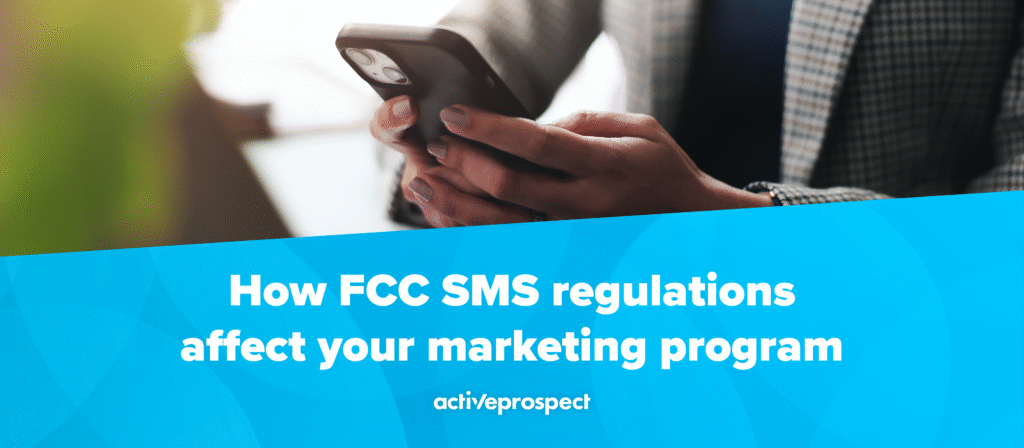How FCC SMS regulations affect your marketing program

During our webinar “Mastering TCPA compliance in your SMS marketing program” we had the chance to sit down with attorney and TCPA compliance expert Alexandra Krasovec, Partner at Manatt, Phelps & Phillips, LLP to discuss the future of SMS marketing.
Now, we would like to dive deeper into the main questions for marketers to consider when leveraging SMS marketing strategies.
An overview of the FCC text message regulations
Before we jump right in, let’s go over some key points to keep in mind regarding FCC text messaging regulations:
- Consent: The FCC requires that businesses and organizations obtain prior express written consent (PEWC) from consumers before sending them text messages for marketing purposes, and prior express invitation or permission (PEIP) for informational purposes. This consent must be clear, voluntary, and obtained without requiring the consumer to purchase a product or service.
- Opt-out: Text messages must include a clear and simple way for recipients to opt out of receiving future messages. This can be done by providing a reply keyword (e.g., “STOP”, “opt-out”, etc.) that allows recipients to unsubscribe from the messaging service.
- Identification: Text messages must clearly identify the sender or the business on whose behalf the message is being sent. This can be done by including the sender’s name, contact information, or a recognizable brand name.
- Frequency and content: Text messages should not be sent excessively or in a manner that could be considered harassing or abusive. Additionally, messages should not contain misleading or deceptive content.
- Emergency messages: The FCC allows certain exemptions for emergency messages, such as those related to public safety or health alerts. These messages may be sent without prior consent, but they should still provide recipients with an option to opt out.
It’s important to note that these regulations primarily apply to text messages sent for informational or marketing purposes. Personal, non-commercial messages between individuals are generally not subject to FCC text message regulations.
What’s informational and what’s marketing?
As Alexandra Krasovec explains, “The TCPA takes a very broad view of what constitutes marketing. Basically, anything that’s not purely informational is really considered potentially marketing.”
For example, as Alexandra goes on to explain, even seeking out a Google review could potentially be considered a marketing strategy. If you think about it, the core objective behind such a request is to gain a public advantage, essentially, to boost engagement or to attract potential customers. So, any activity that closely resembles this effort should be classified as marketing. This classification is significant because the requirements for consent vary between informational and marketing communications.
Recapping what happened with the 2025 FCC TCPA updates
The first half of 2025 was a whirlwind for marketers navigating the evolving regulatory landscape of the TCPA. In January 2025, just days before the FCC’s one-to-one consent rule update was set to take effect, the agency issued a surprise order delaying its implementation by one year. This rule would have required telemarketers to potentially obtain separate, specific consent for each individual seller listed in a lead form, raising the bar for what qualifies as prior express written consent.
The marketing industry broadly welcomed the delay, as it temporarily preserved the ability to rely on more flexible or looser, aggregated consent frameworks. However, the story didn’t end there. In a dramatic turn, the 11th Circuit Court of Appeals later further vacated the one-to-one consent update, ruling that the FCC had overstepped its statutory authority to redefine prior express written consent (PEWC). That decision helped further nullify the rule update, removing the more strict consent standard requirement.
Meanwhile, in April 2025, the FCC announced another key delay – this time to a component of the new consent revocation rule, which would have required that a consumer’s opt-out request apply universally to all communications from a business, both marketing and informational messages. That portion of the rule was postponed by one year, until April 11, 2026, giving industries like finance and healthcare more time to adapt their systems. But in January 2026, the consent revocation rule was pushed back once again, this time to January 31, 2027.
Altogether, these shifts underscore just how dynamic – and high-stakes – the compliance landscape remains for performance marketers and lead generators.
If I’m engaging in SMS marketing, am I required to comply with the FCC TCPA text message update?
As attorney Alexandra Krasovec says: “Definitely. If you’re engaging in SMS, you’re not exempt from the FCC order.”
She goes on to advise that “if you are engaging in this activity, you should check your marketing, your disclosures for prior express written consent, your vendor agreements, and the other activities you’re engaging in.”
What if I’m not using an Automatic Telephone Dialing System (ATDS)?
According to Alexandra Krasovec, “We are definitely in a gray area still”.
As she goes on to elaborate, the legal landscapes in different Circuits of the US courts of appeals are quite varied with regard to decisions involving ATDS. For instance, the Third Circuit appears to be leaning towards ruling that certain systems are considered ATDS if they just have the capacity to store phone numbers, whereas the Ninth Circuit emphasizes the method of generating phone numbers – suggesting that if numbers are not produced randomly or sequentially, the use of the system may not be problematic.
However, this topic is far from settled as the contentious issue hinges on the “capacity” of a system to operate as an ATDS. It’s a complex question that requires careful examination by entities engaged in outreach communication. A categorical stance asserting the absence of ATDS usage can be precarious.
It’s about probing into the capabilities of your communication system. For example, even if you believe your calls are made based on a predetermined logic, any element of randomness introduced by the system, such as randomly selecting between two simultaneous matches, could classify it as having ATDS potential, and you wouldn’t even know it.
Consequently, businesses are faced with two potential approaches: conducting an in-depth assessment of their communication systems to ascertain alignment with legal standards or proceeding with caution by assuming ATDS usage and securing the necessary consents. The choice is pivotal and should be determined through meticulous risk assessment and compliance strategies.
At the end of the day, as Alexandra Krasovec points out, there’s a compelling argument in favor of being fully prepared by having all necessary consents documented. Doing so can simplify matters significantly. In the event of a TCPA claim, possessing a properly filled consent record means you’re equipped with evidence to present to any challenger who might arrive with allegations.
This documentation can demonstrate that consent has been obtained and that disclosure obligations have been met. Consequently, should any disputes arise, you’ll find yourself in a more advantageous position than someone who has to endure a lengthy legal process to confirm whether their system qualifies as an ATDS or not.

What can I use to gather and store proof of consent?
TrustedForm provides independent proof of consent that can be used for legal TCPA compliance. Whether you generate leads or purchase them from independent vendors, TrustedForm certificates provide documentation of consent to contact by phone call or text message and insights about the origin and authenticity of each lead.
By adding the TrustedForm web SDK to your web form, TrustedForm records the lead generation event as it happens and provides proof of consent through a TrustedForm Certificate.
The unique certificate can be easily accessed, reviewed, and shared through a URL.
Do state laws differ in regard to the TCPA?
As expressed by Alexandra Krasovec, “State laws do differ from the TCPA in many ways that you might not expect. In some areas, like call times for example, [they are even] conflicting.”
In this regard, Alexandra points out that if you operate as a website publisher or assist your clients in generating leads, determining the required consent becomes a key decision point. Will you collaborate with your lead buyers to define the extent of consent they need? Will there be a joint effort to review and accept the terms of disclosure, ensuring they meet their needs? Or will you opt for a more universal consent form? Pursuing a one-size-fits-all approach comes with its own set of implications, especially with varying state regulations, so you might want to be aware of that.
How long does consent last?
According to Alexandra Krasovec, “Consent is technically good until revoked.”
However, it’s important to note that this isn’t always straightforward. State-specific laws might place temporal limits on consent validity – for example, Georgia enforces a five-year limitation. Other states may be considering similar regulations.
The durability of consent is further complicated by the issue of phone number reassignment. If a customer changes their number, the consent given earlier may no longer be applicable, as the new owner of that number hasn’t agreed to the same terms. Over time, there’s an increased risk of what’s known as “stale consent,” where the contact details you have are no longer up-to-date.
To mitigate this, Alexandra advises implementing internal policies that regularly verify ownership of the contact information. “Don’t just think ‘I get the consent once and I’m done.”
FCC and SMS outreach compliance
The TCPA of 1991 did not specifically mention SMS or text messages. The law was enacted before text messaging was a common form of communication.
However, the FCC, which is the agency responsible for implementing and enforcing the TCPA, has repeatedly clarified and expanded its regulations to address evolving communication technologies. In a series of rulings, the FCC has interpreted the TCPA’s restrictions on “calls” to also apply to text messages. The reasoning is that a text message is a type of “call” under the TCPA when it is delivered to a wireless phone and involves an automated telephone dialing system (ATDS).
The FCC has explicitly stated in its interpretations that unsolicited text messages, like unsolicited voice calls, are a violation of the TCPA. Federal courts have generally deferred to the FCC’s interpretations, finding that the TCPA’s purpose of protecting consumers from unwanted, automated intrusions extends to text messages. While there have been some recent court decisions in the second half of 2025 that have challenged the FCC’s broad interpretation, the consensus advice for a defensible compliance strategy remains that TCPA rules apply to text messages.
FCC SMS compliance best practices
The FCC SMS opt-in regulations lay out specific requirements for businesses and marketers who want to send SMS messages to consumers, especially for marketing or promotional purposes.
Here’s an overview of the key recommended FCC SMS compliance best practices to help you text with confidence:
1. Get Prior Express Written Consent (PEWC)
- Opt-in is required before sending marketing texts. Consumers must knowingly give their mobile number and agree to receive SMS communications.
- Consent must be “clear and conspicuous.” Don’t bury it in a long privacy policy.
For marketing/promotional SMS, the opt-in should be written (including digital forms) and clearly tied to the messages you’ll send.
2. Disclose key information at opt-in
- Identify your business or brand.
- State the type/frequency of texts (e.g., “up to 4 msgs/month”).
- Mention that message and data rates may apply.
- Provide a clear opt-out mechanism (“Text STOP to cancel”).
3. Provide easy opt-out
- Include an opt-out instruction (like “Reply STOP to unsubscribe”) in your initial and periodic messages.
- Honor opt-out requests promptly—typically immediately or within a reasonable timeframe.
- Ensure your SMS system can capture and process nonstandard opt-out phrases (“please stop texting me”) as revocation of consent.
4. Keep accurate records
- Maintain records of consent, including date/time, source, and the disclosure shown to the consumer at sign-up.
- Track opt-out logs to prove compliance if challenged.
5. Separate transactional from marketing messages
- Transactional or informational texts (appointment reminders, order updates) generally require a lower level of consent, but you must not slip in marketing content unless you have full marketing consent.
6. Protect consumer data
- Use secure storage for mobile numbers and consent data.
- Only use the numbers for the stated purpose.
7. Respect timing and frequency
- Avoid sending texts during prohibited hours (e.g., before 8 a.m. or after 9 p.m. local time).
- Send messages at a reasonable cadence to reduce complaints and improve deliverability.
8. Use recognizable sender IDs
- Make sure recipients can identify your business easily.
- Don’t spoof numbers or use misleading IDs.
9. Monitor third parties
- If you work with vendors or affiliates, ensure they comply with FCC SMS compliance rules, too.
- Use tools like TrustedForm to document consent and LeadConduit to filter and verify leads in real time.
10. Be aware of FCC SMS 160-character length
- A single text that exceeds the FCC SMS 160-character limit may be treated as multiple messages for TCPA purposes, even if it appears as one continuous message on the consumer’s phone.
- Courts may focus on how messages are technically transmitted rather than how they are displayed, which can affect DNC claims and statutory damages.
- To reduce risk, keep marketing texts concise and assume longer messages could count as more than one contact within a 12-month period.
Bottom line: Always secure clear consent, disclose who you are and what you’ll send, provide easy opt-outs, and maintain thorough records. Doing so helps you avoid fines, protect your brand reputation, and build trust with your audience.
Can I cold call someone and then ask for their consent?
If you are using ATDS technology for calling, “You can’t do that. You have to actually have the consent to make the outreach in the first place.”
As Alexandra Krasovec goes on to elaborate, in order to be compliant, gaining explicit consent is essential before sending any text messages. It is not permissible to text someone and request their permission afterward.
However, there’s a slight variation in approach whereby you can encourage a user’s proactive engagement with a call to action. For example, if a user opts into a text marketing campaign by responding to an invitation to text a provided number for more information or to join a program, it is acceptable. Under such circumstances, you could then text them a link to a web form to officially complete the signup process – this scenario is permissible.
Do I need express consent for ringless voicemail?
As expressed by Alexandra Krasovec, “Ringless voicemails are pre-recorded or artificial voice calls according to both the courts and the FCC. So, you are not going to be exempt from the automated calling provisions using ringless voicemail. You need to comply. So if your ringless voicemail is informational, then you need to get prior express consent, and if it’s marketing, you need prior express written consent.”
For a refresher on the differences between express consent and prior express written consent, check out this blog post.
Key takeaways about the FCC TCPA text message update
Here are the main takeaways that we were able to gather from our conversation with attorney Alexandra Krasovec:
- “SMS is a great way to communicate with your customers. Super popular. Lots of people are doing it. You want to join the bandwagon, that’s totally fine. Just remember that when you do, you’re buying risk. So you’re going to want to be doing what you need to do to reduce that risk to the extent you can. TCPA is not a joke.”
- “If you’re getting that consent, which again, you should, you have to make sure it’s right. So, if you think you’re getting informational consent, make sure that the communications you’re sending fit within that bucket. And if you are making marketing outreach, get that heightened prior express written consent.”
- “Don’t assume that just because you’re sending text messages, you’re not using an ATDS.”
- “If you’re saying you’re not using an auto dialer, the question that you should ask yourself is whether or not anyone has actually given you a legal opinion on that. And if they haven’t, consider whether or not you want to get one. If you are not collecting consent based upon that assumption, then that is probably a very important thing for you to consider.”
- “You really do need to make sure that you’re obtaining the consent […] and if you’re in doubt on what level of consent, there is no harm in going conservative, right? Especially if you’re going through the trouble of collecting consent to begin with. It’s a small change to collect the consent versus the kind of gymnastics you’re going to have to do in arguing that you weren’t required to get it.”
- “Pay attention to what the FCC is doing because we’re gonna have more rules soon.”
And ActiveProspect is here to help you stay updated and navigate these new TCPA regulations with confidence. Watch the entire episode and register for our FCC webinar series.
If you’d like to never miss a TCPA update, subscribe to InsideCBM now!
DISCLAIMER: This page and all related links are provided for general informational and educational purposes only and are not legal advice. ActiveProspect does not warrant or guarantee this information will provide you with legal protection or compliance. Please consult with your legal counsel for legal and compliance advice. You are responsible for using any ActiveProspect Services in a legally compliant manner pursuant to ActiveProspect’s Terms of Service. Any quotes contained herein belong to the person(s) quoted and do not necessarily represent the views and/or opinions of ActiveProspect.









